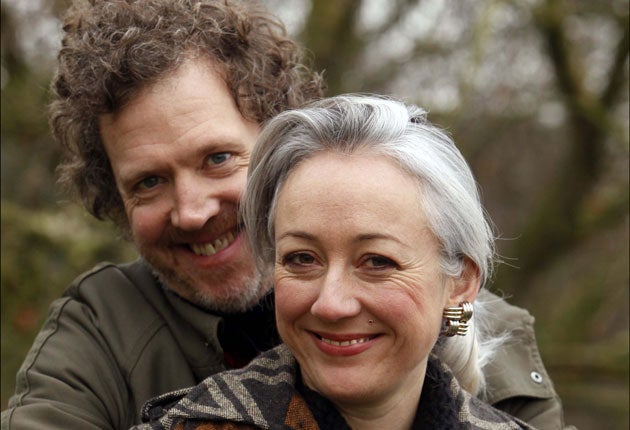Love is futile, the therapist used to preach. Look at her now

When the London psychotherapist, Anouchka Grose, began writing her pessimistic self-help book No More Silly Love Songs, she was wary about her chances of finding love. Her one burning question about romance was: "Why bother?"
But halfway through penning the tale, this self-styled "realist about romance" met her current boyfriend. He changed her thinking forever and the couple are now planning their future together.
While No More Silly Love Songs, published in paperback next month, is dedicated to "Martin", Grose has kept her paramour's identity a secret until now. For her knight in shining armour is none other than Martin Creed, an internationally renowned artist known for his bleak nihilistic art work and for fronting a Gothic rock band whose songs contain "f*** off" as their only lyrics.
Grose met Turner-prize winning artist Creed halfway through writing her book in 2008. Initially, the cold subject matter of his art put her off. Now, the couple happily live in separate houses, have been dating for two-and-a-half years, and have no plans to get married.
"I had been putting off meeting him for a long time," said Grose. "I didn't have high hopes for being set up with him because I knew about his work. I thought he would be austere.
"I like big, soppy musicals and have quite baroque tastes. I didn't think we were designed to be together. I didn't think he was the person to cheer me up." Grose said a mutual friend had wanted to introduce her to Creed, though she stalled because of her preconceptions. Eventually, Creed surprised her by arriving at lunch unannounced. "Literally in 10 minutes of meeting him I wanted to be his friend," she added. "We went out to dinner and there was instant attraction, and soon it became a relationship. As part of my pessimism, I didn't tell any of my friends. They would laugh about me having a secret boyfriend. I didn't want to get other people involved. It was no one's business in a way."
Grose said the secret to their success was deciding not to live together. "We tried to keep it as it was," she added. "We both said we liked our own space and we worked out that while we liked seeing each other, we also liked being on our own."
Grose, 40, was born in Sydney to a journalist mother and art historian father. She moved to London as a child. She dropped out of school aged 16 and joined a band in 1990 with Terry Hall, formerly of the Specials. She studied art at Goldsmiths before training as an analyst, aged 32.
Creed won the Turner Prize in 2001 for Work No. 227, the lights going on and off, an empty room in which the lights did indeed periodically turn on and off. In 1994, he formed the rock band, Owada, who released their debut album, Nothing, in 1997. He now performs under his own name, with recent gigs described as "a humourous compression of maximum expression pushing the extremes of noise and silence". His other artwork, characterised by its austerity, includes Work No. 79, some Blue-Tack kneaded, rolled into a ball and depressed against a wall (1993) and Work No. 88, a sheet of A4 paper crumpled into a ball (1994).
"I started off as very pessimistic because of all the things I'd gone through," continued Grose.
"Love can often be very hard on people. They can kill each other and hit each other and make them unhappy, or bore each other to death. Whichever way love comes, this was originally a book about why we bother. What's so compelling about something that so often goes wrong?"
The psychotherapist said her cynical view of love was partly influenced by her career. "I speak to a lot of people about the things going wrong in their lives. It seemed like it was very difficult to make it work. But it can."
Extract
When I began this book I had one burning question about love: “Why bother?”.
Based on the pain I was feeling, it seemed to me a question worth asking. I already have a very excellent daughter, and am not especially keen to have another. I have much better friends than I deserve. There is the question of sex, but then some of the more open minded of these friends had even offered to help out with that.
There seemed no obvious reason to go through the very painful and difficult process of getting seriously involved with another person – apart from the fact that without that kind of intimacy life could start to seem a bit surface-skimming and dull.
But then when you dipped below the surface with anyone it was scary. Perhaps more so after nearly a decade of marriage, and the few garbled attempts at relationships that followed. You could almost see the ending before the beginning. And anyone genuinely interesting had even more hang-ups about it than me. All my single friends were in the same boat. And lots of my couple friends were pretty troubled about the whole business too, only for different reasons.
Join our commenting forum
Join thought-provoking conversations, follow other Independent readers and see their replies
Comments
Bookmark popover
Removed from bookmarks